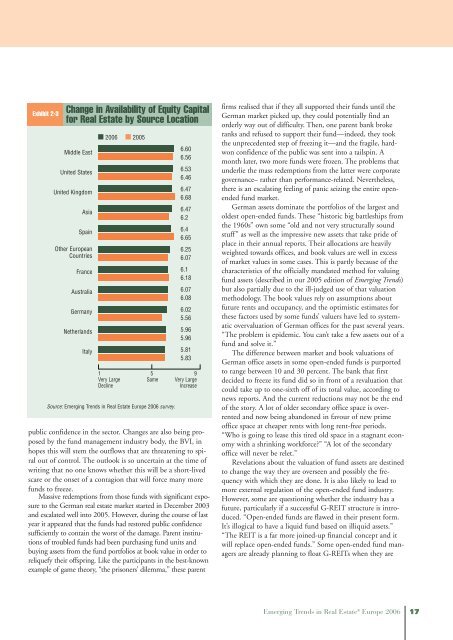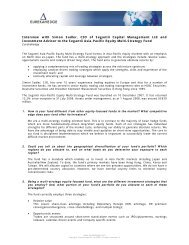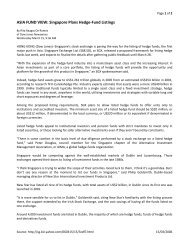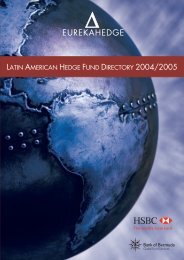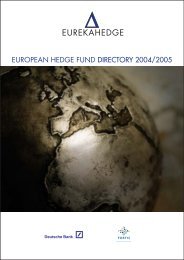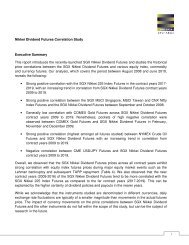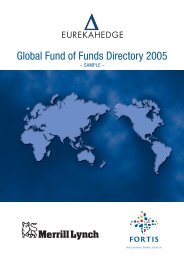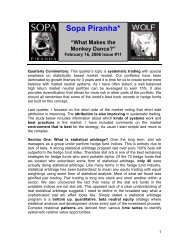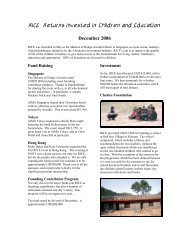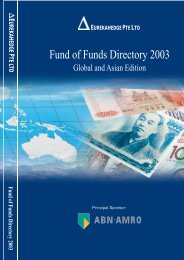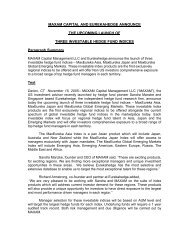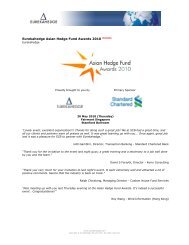Emerging Trends in Real Estate® Europe 2006 - Urban Land Institute
Emerging Trends in Real Estate® Europe 2006 - Urban Land Institute
Emerging Trends in Real Estate® Europe 2006 - Urban Land Institute
Create successful ePaper yourself
Turn your PDF publications into a flip-book with our unique Google optimized e-Paper software.
Exhibit 2-3<br />
Change <strong>in</strong> Availability of Equity Capital<br />
for <strong>Real</strong> Estate by Source Location<br />
Middle East<br />
United States<br />
United K<strong>in</strong>gdom<br />
Asia<br />
Spa<strong>in</strong><br />
Other <strong>Europe</strong>an<br />
Countries<br />
France<br />
Australia<br />
Germany<br />
Netherlands<br />
Italy<br />
■ <strong>2006</strong> ■ 2005<br />
6.60<br />
6.56<br />
6.53<br />
6.46<br />
6.47<br />
6.68<br />
6.47<br />
6.2<br />
6.4<br />
6.65<br />
6.25<br />
6.07<br />
6.1<br />
6.18<br />
6.07<br />
6.08<br />
6.02<br />
5.56<br />
5.96<br />
5.96<br />
5.81<br />
5.83<br />
0.0<br />
1<br />
4.5<br />
5<br />
9.0<br />
9<br />
Very Large Same Very Large<br />
Decl<strong>in</strong>e Increase<br />
Source: <strong>Emerg<strong>in</strong>g</strong> <strong>Trends</strong> <strong>in</strong> <strong>Real</strong> Estate <strong>Europe</strong> <strong>2006</strong> survey.<br />
public confidence <strong>in</strong> the sector. Changes are also be<strong>in</strong>g proposed<br />
by the fund management <strong>in</strong>dustry body, the BVI, <strong>in</strong><br />
hopes this will stem the outflows that are threaten<strong>in</strong>g to spiral<br />
out of control. The outlook is so uncerta<strong>in</strong> at the time of<br />
writ<strong>in</strong>g that no one knows whether this will be a short-lived<br />
scare or the onset of a contagion that will force many more<br />
funds to freeze.<br />
Massive redemptions from those funds with significant exposure<br />
to the German real estate market started <strong>in</strong> December 2003<br />
and escalated well <strong>in</strong>to 2005. However, dur<strong>in</strong>g the course of last<br />
year it appeared that the funds had restored public confidence<br />
sufficiently to conta<strong>in</strong> the worst of the damage. Parent <strong>in</strong>stitutions<br />
of troubled funds had been purchas<strong>in</strong>g fund units and<br />
buy<strong>in</strong>g assets from the fund portfolios at book value <strong>in</strong> order to<br />
reliquefy their offspr<strong>in</strong>g. Like the participants <strong>in</strong> the best-known<br />
example of game theory, “the prisoners’ dilemma,” these parent<br />
firms realised that if they all supported their funds until the<br />
German market picked up, they could potentially f<strong>in</strong>d an<br />
orderly way out of difficulty. Then, one parent bank broke<br />
ranks and refused to support their fund—<strong>in</strong>deed, they took<br />
the unprecedented step of freez<strong>in</strong>g it—and the fragile, hardwon<br />
confidence of the public was sent <strong>in</strong>to a tailsp<strong>in</strong>. A<br />
month later, two more funds were frozen. The problems that<br />
underlie the mass redemptions from the latter were corporate<br />
governance– rather than performance-related. Nevertheless,<br />
there is an escalat<strong>in</strong>g feel<strong>in</strong>g of panic seiz<strong>in</strong>g the entire openended<br />
fund market.<br />
German assets dom<strong>in</strong>ate the portfolios of the largest and<br />
oldest open-ended funds. These “historic big battleships from<br />
the 1960s” own some “old and not very structurally sound<br />
stuff” as well as the impressive new assets that take pride of<br />
place <strong>in</strong> their annual reports. Their allocations are heavily<br />
weighted towards offices, and book values are well <strong>in</strong> excess<br />
of market values <strong>in</strong> some cases. This is partly because of the<br />
characteristics of the officially mandated method for valu<strong>in</strong>g<br />
fund assets (described <strong>in</strong> our 2005 edition of <strong>Emerg<strong>in</strong>g</strong> <strong>Trends</strong>)<br />
but also partially due to the ill-judged use of that valuation<br />
methodology. The book values rely on assumptions about<br />
future rents and occupancy, and the optimistic estimates for<br />
these factors used by some funds’ valuers have led to systematic<br />
overvaluation of German offices for the past several years.<br />
“The problem is epidemic. You can’t take a few assets out of a<br />
fund and solve it.”<br />
The difference between market and book valuations of<br />
German office assets <strong>in</strong> some open-ended funds is purported<br />
to range between 10 and 30 percent. The bank that first<br />
decided to freeze its fund did so <strong>in</strong> front of a revaluation that<br />
could take up to one-sixth off of its total value, accord<strong>in</strong>g to<br />
news reports. And the current reductions may not be the end<br />
of the story. A lot of older secondary office space is overrented<br />
and now be<strong>in</strong>g abandoned <strong>in</strong> favour of new prime<br />
office space at cheaper rents with long rent-free periods.<br />
“Who is go<strong>in</strong>g to lease this tired old space <strong>in</strong> a stagnant economy<br />
with a shr<strong>in</strong>k<strong>in</strong>g workforce?” “A lot of the secondary<br />
office will never be relet.”<br />
Revelations about the valuation of fund assets are dest<strong>in</strong>ed<br />
to change the way they are overseen and possibly the frequency<br />
with which they are done. It is also likely to lead to<br />
more external regulation of the open-ended fund <strong>in</strong>dustry.<br />
However, some are question<strong>in</strong>g whether the <strong>in</strong>dustry has a<br />
future, particularly if a successful G-REIT structure is <strong>in</strong>troduced.<br />
“Open-ended funds are flawed <strong>in</strong> their present form.<br />
It’s illogical to have a liquid fund based on illiquid assets.”<br />
“The REIT is a far more jo<strong>in</strong>ed-up f<strong>in</strong>ancial concept and it<br />
will replace open-ended funds.” Some open-ended fund managers<br />
are already plann<strong>in</strong>g to float G-REITs when they are<br />
<strong>Emerg<strong>in</strong>g</strong> <strong>Trends</strong> <strong>in</strong> <strong>Real</strong> Estate ® <strong>Europe</strong> <strong>2006</strong> 17


